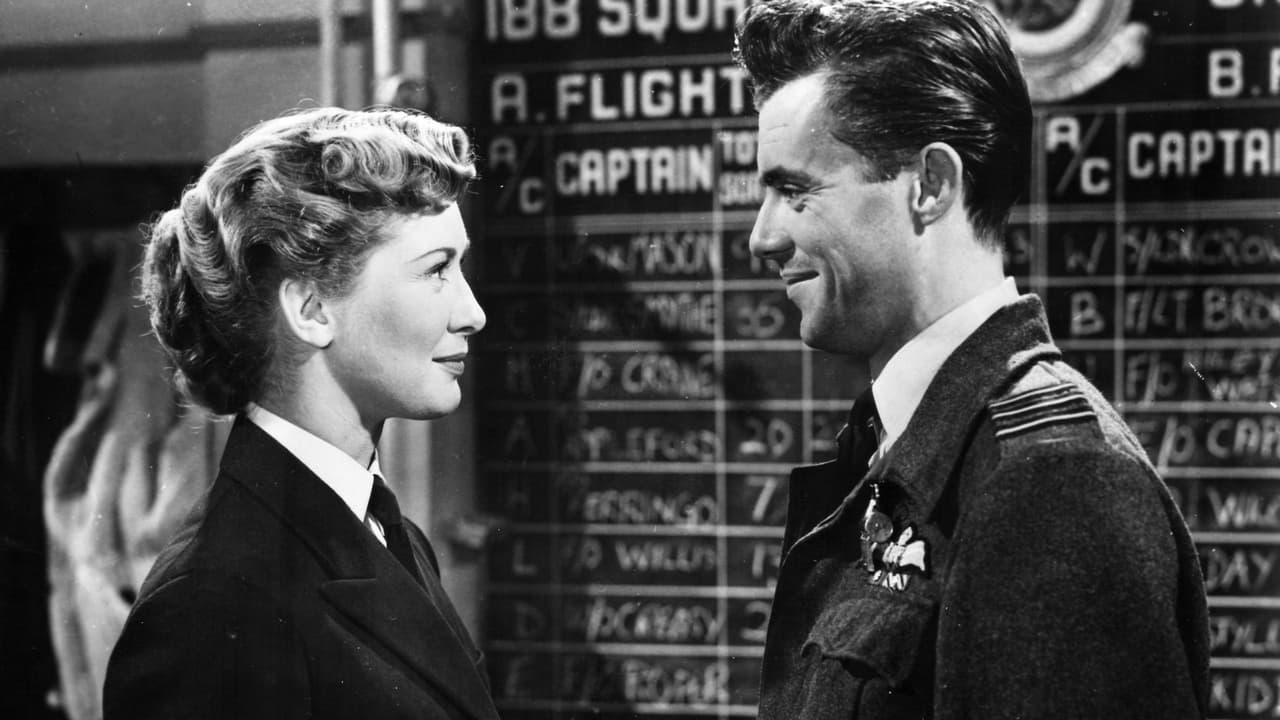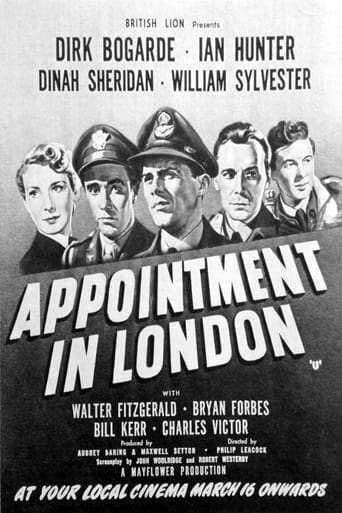Plantiana
Yawn. Poorly Filmed Snooze Fest.
Colibel
Terrible acting, screenplay and direction.
Brightlyme
i know i wasted 90 mins of my life.
Matialth
Good concept, poorly executed.
thefinalcredits
'The Lancaster bombing raid which climaxes the film is just about the best treatment of this subject I have seen.' Daily Mail 1953Not only does this film contain good solid performances and evidence the director's solid capabilities, but more importantly captures the tension and high risks of serving in Bomber Command in the Second World War. The audience acquires a better feel for the sheer exhaustion and pain at the loss of comrades those serving in these squadrons experienced. The degree of realism achieved was largely the result of the presence in the team of writers of John Wooldridge, who as part of his professional expertise also provided the typically bombastic score. Before becoming a film composer he had been a decorated member of Bomber Command, who had served alongside Dambuster Guy Gibson. Moreover, the links with that famous bombing raid are further bolstered by the fact that Dirk Bogarde based his interpretation of Wing Commander Tim Mason on Gibson, while the Lancasters used in this production would two years later be captured to magnificent effect as cinematic tribute to the 'Dambusters' in the much more revered film detailing their exploits. Bogarde is nothing short of excellent in portraying a committed commanding officer who has flown too many sorties, and whose determination to fly one more mission, despite his mental exhaustion, leads him to be grounded by his superiors. Though well- respected by his men, a combination of recent losses and near-misses gradually lead to the feeling that both their commander and the squadron are jinxed. This escalates after the loss of one of the most popular members of the squadron, played by a youthful Brian Forbes. Bogarde's character holds himself responsible for the loss of this young pilot having reprimanded him prior to his fateful mission about endangering the secrecy of the squadron's missions. This was by sending coded messages to his girlfriend notifying her of his safe return after each previous mission completed. This sequence of events leads to one of the most memorable scenes of the movie when the lost pilot's wife reveals that her deceased partner had hidden their marriage, conscious of his commanding officer's demands that nothing should interfere with their focus on the mission at hand. The weakest element of the movie is the unconvincing love interest provided by Dinah Sheridan, obviously introduced to soften Bogarde's attitude to the importance of civilian life for his men. By contrast, the film achieves great dramatic effect with its depiction of the final mission over occupied Holland. This results from the director, Philip Leacock's earlier expertise in his career as a director of documentaries, with it's subtle interplay between genuine pictures of a Bomber Command mission, special effect lighting, and realistic radio communication. The title of the film not only is far better than that it acquired on its US release ('Raiders of the Skies') but has poignant significance to the film's story-line. The eponymous appointment refers to that which Bryan Forbes' character was never able to attend to pick up his Distinguished Flying Cross from Buckingham Palace for his bravery under fire. In the final scene of the film we accompany Mason, and a fellow pilot, as they head towards their own medals for gallantry, together with the widow of this lost colleague. Atmospheric despite its low key approach, this British feature sits comfortably against its much better known American counterpart, 'Twelve O'Clock High', released four years earlier.
robert-temple-1
This film was also released as APPOINTMENT IN London. Dirk Bogarde is the stalwart star of this wartime drama centered around the lives of the men of a bomber squadron based at Lincoln. A great deal of original aerial footage is edited into the film throughout, culminating in a huge bombing raid over Germany in the latter part of the film, which shows a genuine squadron flying in formation at night, and features the most astonishing real footage of the roaring inferno produced by such a bombing raid. There are also some shots of London in 1952 showing that there was still almost no traffic. Bogarde plays Wing Commander Mason, who at the beginning of the film has flown 87 sorties over Germany and is being urged on all sides to call it quits, but he is determined to go on until he completes 90 missions, because 'I have set my mind on it'. However, he is getting over-tired and everyone worries that he will make mistakes or simply not make it. My wife likes Bogarde a great deal. She used to be taken by her mother to tea with him and his mother in Denham Village when she was a child, when she became entranced by him and his peculiar charm. His mother was apparently rather butch. I only met him and chatted with him on one occasion, at Shepperton. He was certainly a major figure in the history of British cinema. He could be rather waspish, and was no heterosexual. One old friend of ours unexpectedly turned up on the credits of this film, Cecil Ford. He was credited as Assistant Director. I checked IMDb, and he had already been an assistant director for five years by this time. The next year he moved up to Production Manager. Dinah Sheridan plays the love interest in this film. Although everyone thought she was an English rose, Sheridan was really half Russian and half German. She did very well in the part, showing great restraint as 'a widow since Dunkirk' and not falling for the first airman she sees. Everyone in the film is very restrained indeed, and all the upper lips are stiff in the Old Style. This is seriously traditional British fare. Bryan Forbes does very well as an airman who doesn't make it. His wife is played by the interesting actress Anne Leon, who died long ago and made few films. She was very effective, but as she was no glamour gal, it seems she was not offered many parts. It is always a pity when people of talent are not properly recognised. In terms of names we might recognise today, Nigel Stock is uncredited as a co-pilot, not that you would notice. And that is about it. The film was ably directed by Philip Leacock, who went on to make another film with Dirk Bogarde three years later, THE Spanish GARDENER, and later in life was primarily a director of many popular television series. This film is probably about as realistic as you can get, as a portrait of Bomber Command in operation during the War. But it never sacrifices fiction for fact, and maintains strong story lines and dramatic narrative throughout, with all the accuracy serving to make it more moving and authentic.
alfa-16
This is an unusual film. As others have commented it is well made, tautly scripted and has very good central performances. But that isn't what singles it out.It's commonly thought that night time area bombing by the RAF was a hit or miss affair, quite different from daylight precision bombing done by the USAAF. Whilst no one can argue that targets were easier to see during daylight hours, both the RAF and the Luftwaffe developed highly accurate methods of hitting their targets at night. In the fateful Dresden raid in February 1945, almost 95% of the RAF bombload fell within one mile of the markers placed with 50 metre accuracy by the Mosquito target illuminator aircraft. The following day, a quarter of the American daylight force sent to follow up bombed Prague, having mistaken one bend in the River Elbe for another. This film depicts, at length, the method of target marking the flight path using coloured airburst flares, eliminating 'creepback' by approaching the target along different vectors, air and ground marking the target and using a 'Master Bomber' to control the incoming streams and give bomb aimers feedback on accuracy.No medal was struck for Bomber Command and many of the crew themselves felt their contribution was best forgotten, so this film is one of the few accurate testaments to their courage.
simonsnape
This is probably the most realistic drama filmed about Bomber Command late in WWII. The technical details are superb.. the right aircraft in the right locations with the correct props and background.The acting really is first class and if it seems a little stilted then that's how it was then... if you don't believe me watch "Target for Tonight" which covered a Wellington Bomber mission early in the war and used real RAF crews .There are no over the top heroics, but the mood is just right, with a constant tension even in moments of relaxation... the war had become a relentless exercise in mechanised killing with operational crews knowing that the chances of them living to complete a full tour of 30 operations was one in four at best, but they just got on with it. far better than "The Dam Busters".

